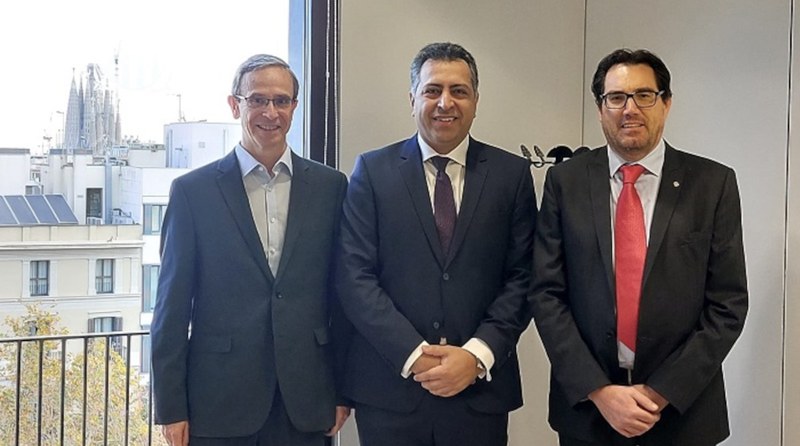Neuron IP Establishes its First European Semiconductor R&D Centre at UPC's Diagonal Nord Campus K2M
Nov 27, 2024
Canadian company Neuron IP has opened its first European semiconductor R&D centre in Barcelona, with facilities located in the K2M building on the UPC's Diagonal Nord Campus.
Canadian company Neuron IP has set up its first R&D centre for semiconductors in Europe, located in the K2M building on the Diagonal Nord Campus of the Universitat Politècnica de Catalunya - BarcelonaTech (UPC) in Barcelona. This was announced by the Secretary for Business and Competitiveness and CEO of ACCIÓ, Jaume Baró; the company's founder, Saman Sadar, and the Vice-Rector for Knowledge Transfer, Innovation and Entrepreneurship at UPC, Climent Molins, who held a working meeting today, 27th November.
To establish itself in Catalonia, Neuron IP received support from ACCIÓ —the agency for business competitiveness within the Department of Business and Labour—, through its foreign investment attraction area, Catalonia Trade & Investment, which advises and assists companies even after they have set up in Catalonia.
Neuron IP’s objective is for this R&D centre to become its main hub outside North America. It will focus on the design of silicon interfaces and so-called 'chiplet' technologies, which are capsules that facilitate the integration of chips onto semiconductor boards. In fact, these facilities, for which the company has invested ten million euros, will also include a test laboratory and will become the company's European headquarters.
For the Secretary for Business and Competitiveness and CEO of ACCIÓ, Jaume Baró, projects like Neuron IP’s allow “Catalonia’s position in the semiconductor sector to scale up, because an international company choosing Barcelona places our country among the leading territories in this industry's value chain.” According to Baró Torres, “boosting the semiconductor industry is one of the Government’s main priorities, as it is a fundamental sector for the country's economic growth and creates high-quality jobs.”
According to Neuron IP founder and president, Saman Sadar, the company intends to “invest significantly in establishing operations in Europe, starting with Barcelona as a key hub and with plans for strategic expansion across Spain.” Sadar states that “Barcelona has a strong global reputation for developing new technologies and possesses the infrastructure, talent, and ecosystem to enable the sustainable growth of start-ups.” The president of Neuron IP highlights that the Catalan capital offers “a unique combination of innovation and culture, spanning academia, industry, and government support.”
Neuron IP will invest in creating and training a specialised design team, aiming to reach around thirty people during its first year in Catalonia, a figure expected to rise to one hundred in the coming years. To achieve this, it has invested ten million euros in an initial phase. “Building a company culture with growth opportunities is fundamental to our success, and we hope to leverage this legacy to enhance Catalonia’s semiconductor engineering ecosystem,” Sadar emphasises. He highly values that in Catalonia they have found “the talent needed to grow, which includes both brilliant future engineering talents and industry veterans.” In fact, the Canadian company has collaborated with UPC to seek highly qualified talent in the field of engineering, with varying degrees of specialisation in areas such as silicon processing, chiplet design, and subsequent validation, among others.
The Vice-Rector for Knowledge Transfer, Innovation and Entrepreneurship at UPC, Climent Molins, states that “the consolidation of a Research and Design office for NEURON IP at the UPC Diagonal Nord Campus represents a substantial contribution to the Catalan semiconductor and microelectronics ecosystem. The company will maintain a close relationship with the interuniversity master's degree in Semiconductor Engineering and Microelectronic Design within the strategic framework of high-tech encapsulated integrated circuits, as well as with research groups at UPC, Universitat Autònoma de Barcelona (UAB), and the Barcelona Microelectronics Institute (IMB-CNM) of the Spanish National Research Council (CSIC). The company will decisively contribute to talent creation in the strategic field of semiconductors.”
Founded in 2020 in Toronto, Canada, Neuron IP currently has 45 employees globally. They also have a team in Mexico, in addition to their headquarters in Canada and the new facilities in Barcelona.
The Semiconductor Ecosystem in Catalonia
This November, Catalonia assumed the vice-presidency of the European Semiconductor Regions Alliance (ESRA), which the Italian region of Piedmont will chair next year. This is the first step before Catalonia takes over the presidency of the entity in 2026. The ESRA's objective is to focus on regions in deploying policies to boost semiconductors in Europe within the framework of the European Chips Act, which aims to provide the continent with greater technological sovereignty and production capacity.
Catalonia is already one of the most dynamic regions on the continent in the field of semiconductors. In fact, on May 21st, the Catalonia Semiconductor and Chip Alliance was presented, comprising over 50 companies and entities.
In total, according to ACCIÓ data in the report 'Semiconductors in Catalonia', there are now 260 agents forming part of this ecosystem, including companies, entities, technology centres, and research institutes. Together, these agents generate a business volume of 302 million euros and a talent pool of over 4,600 highly qualified professionals. Furthermore, Catalonia is the third region in the European Union to have attracted the most foreign investment projects in this field since the announcement of the European Chips Act in 2022.

Share: